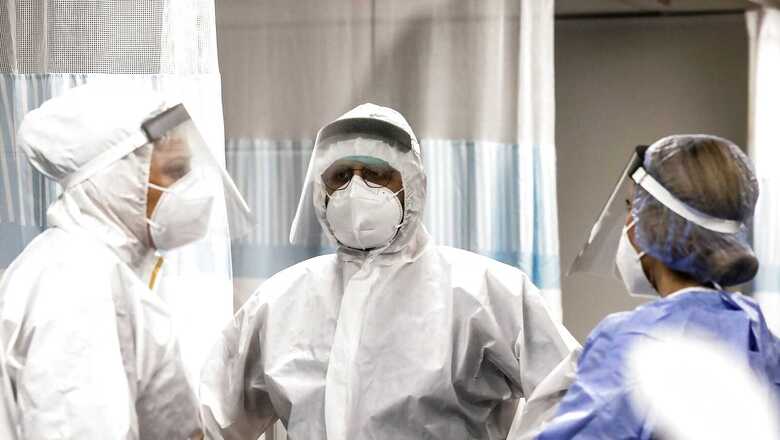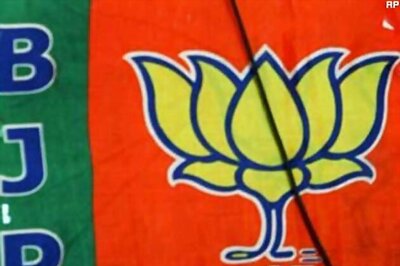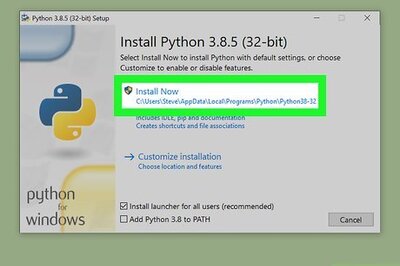
views
One of the first people in the world to become infected in the world with the new coronavirus variant, omicron, an Israeli doctor has said he believes he contracted the virus when he was in London on November 19 for a major medical conference attended by over 1,200 people.
FOLLOW | Coronavirus LIVE Updates: 2 Omicron Cases in Karnataka; CM Bommai Says Will Issue New Rules in Ist Reaction at News18 India Chaupal
The omicron variant is said to have been discovered in South Africa around the same time the doctor was in London. This could show that the variant may have emerged even before its discovery in the African continent. Dr Elad Maor, a cardiologist at Sheba Medical Centre near Tel Aviv, told The Guardian in an exclusive interview that he arrived in London on November 19, and stayed at a hotel in North London for four days. After he returned to Israel on November 23, he began experiencing symptoms and tested Covid-19 positive on November 27.
It is known that time from exposure to onset of symptoms is typically 14 days, though symptoms appear within five days. Keeping the doctor’s time frame in mind, it is important to note that scientists in South Africa notified the World Health Organization (WHO) about the emergence of a new variant only on November 24. Following this, on November 27, the WHO’s advisory panel announced that the new variant omicron was a ‘variant of concern’.
But Dr Maor had already tested positive for the virus on November 27, making it clear that the variant was already in circulation in London by that time. This shows that the dateline for the emergence of omicron can be pushed further back than its earlier time frame of mid-November.
According to the interview, Dr Maor has, so far, shown mild Covid-19 symptoms, including fever, muscle ache and a sore throat. Dr Maor told The Guardian that while he could not be certain about how or when he became infected, he suspected that other participants could have been exposed too. One of his colleagues has since tested positive for the omicron variant.
He was quoted as saying, “I got the omicron in London, for sure… That is interesting because that was 10 days ago in London – really, really early.” Dr Maor has received three doses of the Pfizer Covid-19 vaccine. He is self-isolating back home in Israel.
Dr Maor’s case will raise fears whether the omicron variant was present in UK and Europe before it was notified by the WHO. Europe has witnessed a massive surge in Covid cases, with countries like Germany and Austria reintroducing lockdown measures as well as stringent mandatory vaccinations. The new variant has sparked global concern with countries putting travel bans and restrictions once again, all the while screening positive samples of incoming travellers for the presence of the new variant. Omicron has already shown its presence in 15 countries.
There is paramount fear that the new variant could spread quickly even among vaccinated populations due to its constellation of mutations, which could lead to a change in the way the virus behaves. So far, however, South Africa has had to deal with the brunt of the discovery.
How scientists spotted omicron
On November 19, head of science at one of South Africa’s biggest private laboratories, Raquel Viana was sequencing the genes on eight coronavirus samples in the Lancet lab. She realised there were a large number of mutations on the samples, especially on the spike protein that the virus uses to enter human cells.
She called a colleague at the National Institute for Communicable Diseases (NICD) in Johannesburg, gene sequencer Daniel Amoako. Along with his team, Dr Amoako also tested the eight samples sent by Viana and correlated them to a sharp rise in Covid-19 infections, which might indicate a new mutant.
Earlier in November, a colleague had also alerted Viana to an oddity in the sample — an S-gene was missing. This is one of the mutations distinguishing the new omicron variant from the delta variant.
According to a report in Bloomberg, junior Lancet scientist Alicia Vermeulen was credited with making the initial find on the afternoon of November 4, when she noticed an anomaly in a single positive test. The same anomaly was then picked up several times over the week.
By November 22, the NICD and Lancet were able to determine a new variant, initially known as B.1.1.529. The S-gene could not be detected as it had mutated. On November 24, NICD officials notified the WHO, following which an advisory panel classified omicron as a highly transmissible variant of concern.
The NICD also entered the data into the GISAID global science database, and found that Botswana and Hong Kong had also reported cases with the same gene sequence.
(With inputs from Reuters and other agencies)
Read all the Latest News here




















Comments
0 comment